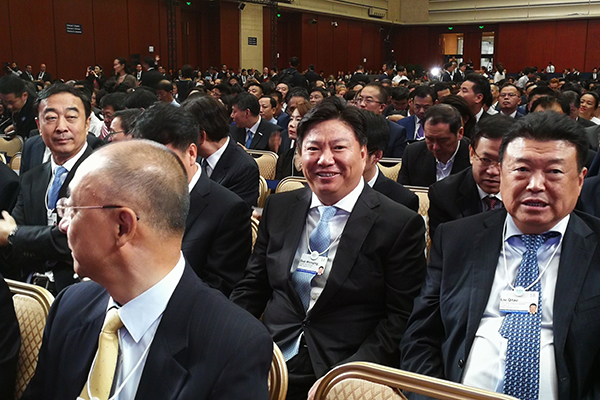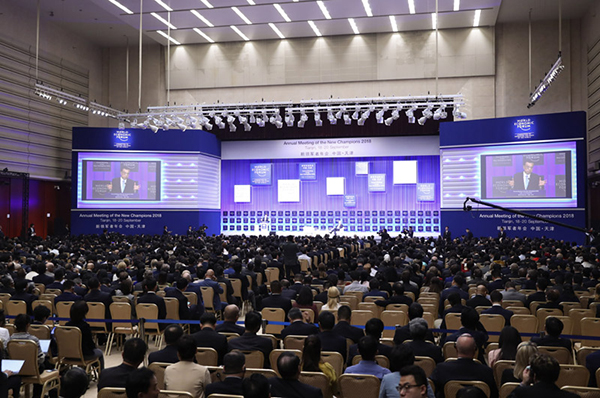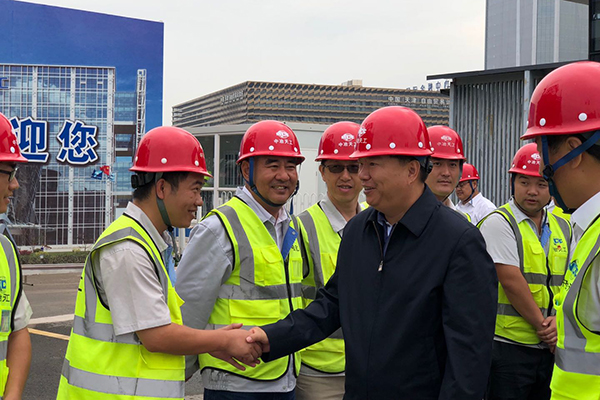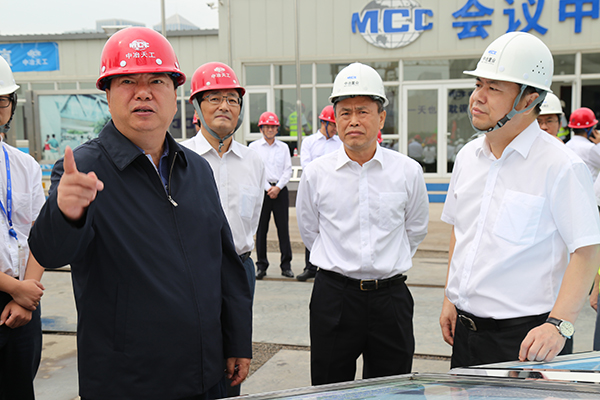



From September 18 to 20, Tianjin staged the Annual Meeting of the New Champions of the World Economic Forum (WEF), also known as Summer Davos, at Meijiang Convention and Exhibition Center. Themed on the Fourth Industrial Revolution, this was so far the biggest summit in the WEF history. At the opening ceremony on the morning of September 19, Chinese Premier Li Keqiang addressed to an audience including Mr. Guo Wenqing, China Minmetals’ President and Party Group Deputy Secretary and MCC Chairman.
Li said, “Since its inception years ago, the Summer Davos Forum has borne witness to the efforts by various countries to tackle the global financial crisis and bring about global recovery. After surviving all the hardships and setbacks, the global economy has shown signs of rebound on the whole. But the world is faced with rising uncertainties and destabilizing factors, and a growing backlash against globalization. How to boost the new drivers to secure sustained growth of the global economy is a key area of concern for all of us.” In this context, the theme of this Annual Meeting, “Shaping Innovative Societies in the Fourth Industrial Revolution”, cannot be more relevant.
“In his keynote speech at the World Economic Forum early last year, President Xi Jinping stated China’s firm commitment to economic globalization, free trade and innovation-driven development. As we mark the 40th anniversary of reform and opening-up in China this year, we have introduced a host of major steps to deepen reform, expand opening-up and advance innovation.”
“To boost the new drivers of global growth, we need to firmly uphold economic globalization. The rules-based multilateral trading system is the bedrock of economic globalization and free trade. The authority and efficacy of the system should be respected and protected. Taking a unilateralist approach will not solve any problems. We must draw on each other’s comparative strengths to facilitate the new industrial revolution. We need to make development more inclusive and achieve more inclusive development that benefits all. We need to pursue integrated innovation and development, and open up broader space for the development of the new growth drivers.”
Li added, “China has made vigorous efforts to nurture new growth drivers. Facing a weak global economy and downward pressure on the Chinese economy in the past several years, China, instead of resorting to massive stimulus, stayed the course of reform and innovation guided by the new development philosophy. Seizing the opportunity of the new industrial revolution and harnessing our advantages in human resources and market potential, we have focused on enhancing the new growth drivers and accelerating the shift from traditional drivers of growth to new ones.” “We have made vigorous efforts to streamline administration and cut taxes and fees, unlocking market vitality. We have adopted a prudent yet accommodative approach to regulation, contributing to a boom in emerging industries. We have encouraged mass entrepreneurship and innovation, inspiring immense social creativity.” Thanks to these efforts, the new drivers have made unexpected growth and offered strong support for stabilizing economic growth, adjusting the economic structure and creating jobs.
Then Premier Li moved on to China’s economic development and policy orientation. “In the first half of this year, China’s economy expanded by 6.8%, staying within the medium-high growth range of 6.7-6.9% for 12 quarters in a row. On the whole, the Chinese economy has stayed on the track of steady progress, with growing new drivers and sound fundamentals. The Chinese economy is now at a crucial stage of shifting from traditional drivers of growth to new ones, confronted with many difficulties and challenges. We will adhere to the general principle of seeking progress while maintaining a stable performance, and focus on supply-side structural reforms to invigorate the market, bolster self-driven development and unleash the potential of China’s domestic demand. Through these efforts, we aim to keep the economy at a medium-high rate of growth and move our industries to a medium-high level.”
As to specific measures, first, China will work even harder to advance reform and opening-up. We will deepen reforms in all respects, further streamline administration, delegate powers, strengthen compliance oversight and improve government services, further widen market access, continue to lower the tariffs, and exercise fair and impartial regulation to create a market environment in which companies of all ownerships, be they Chinese or foreign-owned, are treated as equals and compete on a level playing field. We will deliver and step up policy measures in support of the private sector.
Second, China will work even harder on restructuring. We will give strong support to emerging industries and services sectors to substantially raise the quality of made–in-China goods and services. We need to increase household incomes through multiple channels to expand the spending power of our consumers. We need to provide more public goods and services, and boost the economy while improving living standards. We need to take actions to stabilize investment and attract extensive social investment.
Third, China will work even harder to stimulate innovation. We will introduce more effective policies and new mechanisms, strive to expand the space for industrial Internet and “Internet + public services”, achieve integrated and synergized development of industries, universities, research institutes and end users in both online and offline activities, and bring mass entrepreneurship and innovation to a higher level. Going forward, we will further strengthen law enforcement and introduce a more rigorous mechanism of punitive compensation for IPR infringements to deter violations and better protect innovators from all sectors.
This year’s Summer Davos drew more than 2,500 delegates from more than 100 countries and regions, including dignitaries such as WEF president Klaus Schwab, president of Latvia Raimonds Vējonis, president of Estonia Kersti Kaljulaid, and Prime Minister of Samoa Tuilaepa Aiono Sailele Malielegaoi.
During his stay in Tianjin, Guo Wenqing led a delegation to the project site of Tianjin Juilliard School, a project developed by MCC Rea Estate Group Co., Ltd. and undertaken by MCC Tiangong Group Corporation Limited. The visit was followed by a meeting with Mr. Zheng Weiming, director of Tianjin Economic-Technological Development Area (TEDA) Steering Committee.
Guo greeted workers at the construction site, inquired in detail about the latest project progress, quality assurance, workplace safety and good engineering practices, in particular about the delivery of key milestones and difficulties and challenges encountered, and raised requirements for relevant work. Guo acknowledged the efforts and achievements made by all contributing parties, appreciated their hard work, and encouraged workers to carry on the momentum and make the project a great success. According to Mr. Guo, the Tianjin Juilliard School project is one of the top 20 projects of the year for the MCC, a high-tech and high-profile project. The project team should realize the political significance of the project, shoulder the responsibility of the MCC as a central SOE, carefully and scientifically plan, organize and operate the project, and go all out in making it a model project and a quality project. To this end, first, it should ensure the project quality, safety and progress through scientific planning and meticulous organization, to the satisfaction of the project owner and local people. Second, it should tighten construction oversight, pursue excellence in quality, plan in advance and compete for engineering awards to increase the MCC’s brand visibility. Third, it should use this project to cultivate specialists, build a team with expertise in infrastructure construction for the cultural and music industries, and create a legacy of technological achievements and high-quality engineering clusters. Fourth, it should make the best of every day to deliver brilliant performance in all respects.
Later, Guo met with TEDA Steering Committee director Zheng Weiming at the meeting room of the project department. The two agreed to work together to build Tianjin Juilliard School into a world-class music institution and exchanged ideas on deepening business-government cooperation.
Guo was accompanied by General Manager Jia Liang and Deputy General Manager Zhang Jinsong of Tianjin New Financial Investment Co., Ltd., Chairman Yang Shitai of Tianjin Yujiapu Holdings (Group), MCC Party Committee Deputy Secretary and President Zhang Mengxing; Liu Fuming, Zhou Qing, Ma Xiaoyang, and Chen Xuejun from MCC; and officials from the International Business Management Division of China Minmetals.

